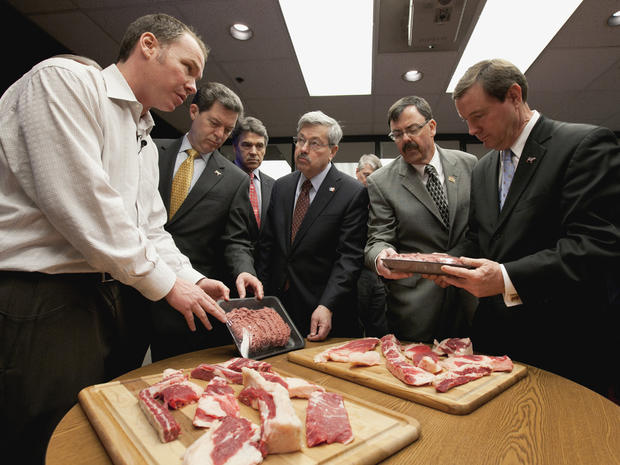"Pink slime" outcry causes Beef Products Inc. to close three plants
(CBS/AP) Beef Products Inc. (BPI), the embattled company behind the meat product colorfully dubbed "pink slime" will shutter processing plants in three states this month because of the controversy surrounding it, a company official said Monday.
The beef with "pink slime" continues as supermarkets, schools drop byproduct
Pink slime in ground beef: What's the big deal?
About 650 jobs will be lost when the plants close on May 25 in Amarillo, Texas; Garden City, Kansas; and Waterloo Iowa, company spokesman Rich Jochum said. A plant in South Sioux City, Neb., will remain open but run at reduced capacity.
The South Dakota-based company blamed the closures on what it said were unfounded attacks over its lean, finely textured beef. The product is a low-cost ingredient in ground beef made from fatty left over meat trimmings from other cuts. The bits are heated to about 100 F and spun to remove most of the fat, compressed into blocks for use in ground meat, and then exposed to "a puff of ammonium hydroxide gas" to kill bacteria, such as E. coli and salmonella.
BPI suspended operations at the three plants in March amid public uproar over the filler, HealthPopreported. The plant in Amarillo produced about 200,000 pounds a day, while the Kansas and Iowa plants each produced about 350,000 pounds a day.
BPI has declined to discuss financial details, but said it took a "substantial" hit after social media exploded with worry over the product and a petition seeking its ouster from schools drew hundreds of thousands of supporters.
The USDA has decided that school districts may stop using it, and some retail chains have pulled products containing it from store shelves, including chains under Safeway Inc., Kroger Co., and Stop & Shop.
Company officials had hoped to recover but have since realized that doing so wasn't possible in the near future, Jochum said Monday. The company paid its workers during the suspension.
"We will continue communicating the benefits of BPI's lean beef, but that process is much more difficult than (countering) the campaign to spread misinformation that brought us to this point," Jochum said in a statement.
State executives who have supported the company blamed what they considered a smear campaign against the product, which has drawn scrutiny even though they and industry officials insist that it's safe.
"This is a sad day for the state of Iowa," said Iowa Gov. Terry Branstad. "The fact that a false, misleading smear campaign can destroy a company's reputation overnight should disturb us all."
The Republican governor said workers will "go home to their families and will soon be without a job, all because some media on the coasts decided to unfairly and viciously smear the product they so proudly produced."
The phrase "pink slime," coined by a federal microbiologist, has appeared in the media at least since a critical 2009 New York Times report. Celebrity chef Jamie Oliver has railed against it, and it made headlines after McDonald's and other major chains discontinued using the product.
But a recent piece by The Daily on the USDA's purchase of meat that included "pink slime" for school lunches touched a nerve with a Texas blogger who focuses on kids' food. She started an online petition asking USDA Secretary Tom Vilsack to halt its use in school food, and the USDA will give schools the option of choosing ground beef that doesn't contain it starting in the fall.
Nebraska Gov. Dave Heineman called the plant closings "unfortunate and needless," and said the product BPI produced is safe for consumption.
"BPI is a good family-owned business, and we will continue to work with them in an effort to continue to promote their safe and healthy beef," Heineman said.
Several politicians who toured one of the plants in March - including Branstad, Texas Gov. Rick Perry, Kansas Gov. Sam Brownback, Nebraska Lt. Gov. Rick Sheehy and South Dakota Lt. Gov. Matt Michels- all agreed with the industry view that the beef has been unfairly maligned and mislabeled, CBS News reported.
The public backlash against the product offers an important lesson to other food makers in the social-media age, said Marion Nestle, a nutrition and food-studies professor at New York University. She noted that past food controversies, such as criticism of trans fats, took years to surface as major public issues, whereas social media enabled the campaign against "pink slime" to quickly attract widespread public attention.
Nestle also said BPI misinterpreted the public concern as a food-safety issue, instead of recognizing that critics were focused on not knowing what was added to their food and the belief that they were deceived.
"It's always sad when people are put out of work," Nestle said. "But this company, they could have handled the whole situation differently. ... They were faced with a public relations disaster of really astonishing proportions."
